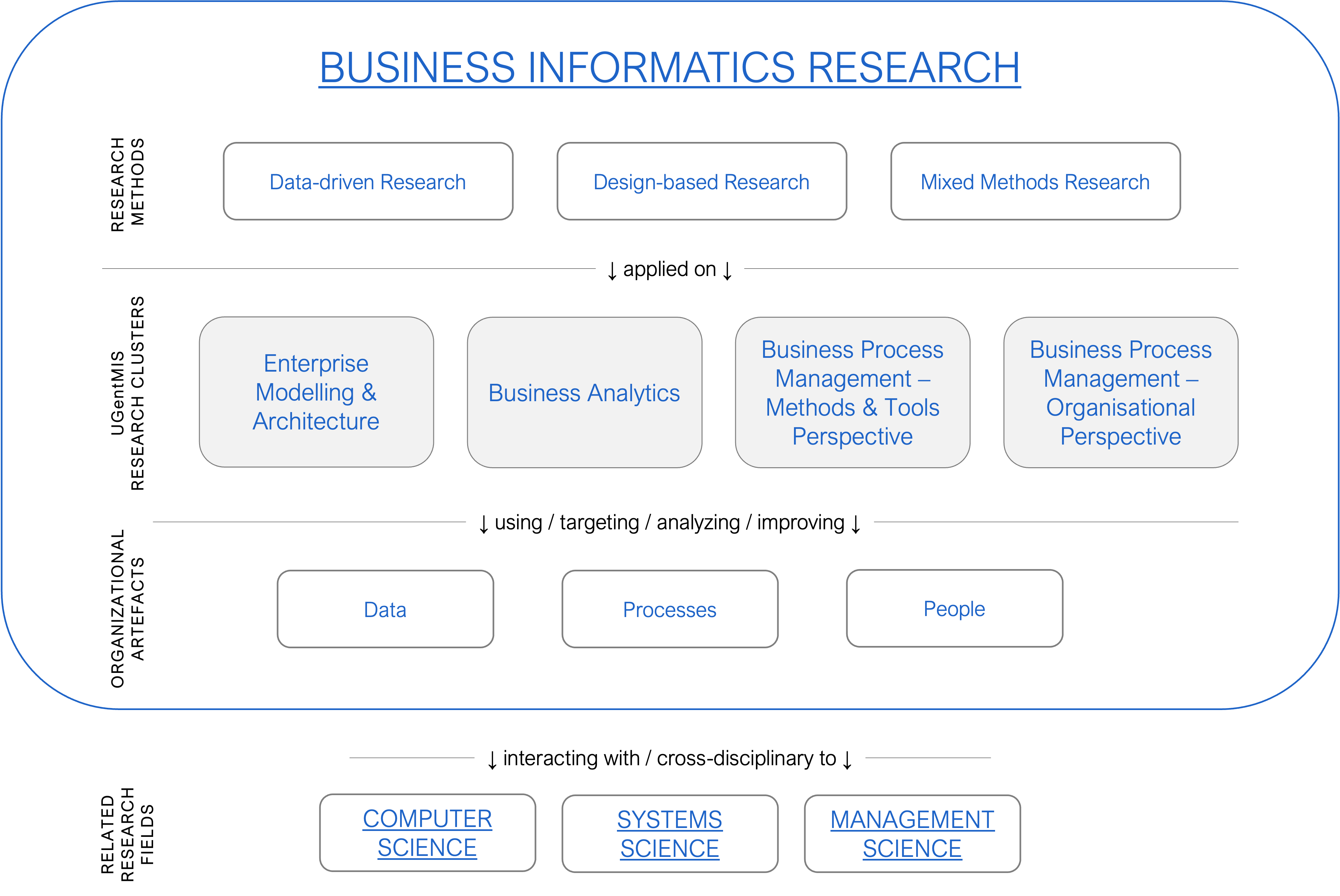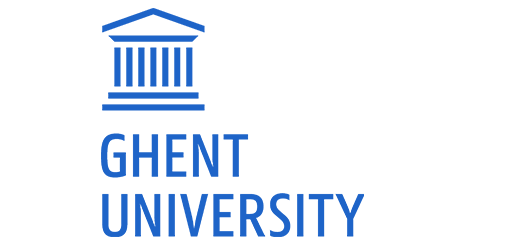Research Vision

The UGent Business Informatics research vision has been translated into “Business Architecture, Analytics, and Process Management”. It consists of four interrelated research clusters:
- EMEA - Enterprise Modelling, Engineering, and Architecture, coordinated by Prof. dr. Poels
- BPM – Technological perspective, coordinated by Prof. dr. Gailly
- BPM – Organizational perspective, coordinated by Prof. dr. Van Looy
- Business Analytics, coordinated by Prof. dr vanden Broucke
Across these clusters, different themes have been identified on which (future) research may particularly focus, such as SMEs, manufacturing industry, public sector, healthcare, service sector, business-IT consultancy and disruptive technologies. Every theme has one or more expert(s) within the UGent Business Informatics research group.
Enterprise Modelling, Engineering, and Architecture research cluster
How to ensure that digital technologies deliver value?
Enterprise Modelling (EM) is the practice of building models of an enterprise (or wholes/parts of enterprises) to gain insights on structures, data/information/knowledge, processes, goals, strategies, business models, operating models, value streams, business capabilities, services, resources, business ecosystem context, technology, etc., for analysing the current situation, predicting/simulating future situations, and designing a desired situation.
Enterprise Engeering (EE) is the engineering of the enterprise based on the insights gained from enterprise modelling. EE is all about translating these insights into actions.
Enterprise Architecture (EA) studies the joint design, implementation, evolution, and management of an organization’s business, data, application and ICT infrastructures. Key objectives of EA are enterprise coherence, strategic alignment and value creation. EA builds on EM and EE.
The EMEA research cluster investigates the conceptualization, representation, visualization and analysis of business architecture components in relation to the other enterprise architecture components. The focus of the research can be one or more of the following: goals, strategic plans, business models, value models, capabilities, business services, business processes, etc. Through investigating the modeling of these concepts we aim at improving the understanding, communication and design of an organization’s business architecture and supporting systems. Pertinent research questions relate to issues of goal satisfaction and strategic fit, value delivery, and capability-oriented thinking. Past and current research includes the conceptualization of business services and service systems, decision-support for value-driven strategic sourcing, the design of personalized information flows for tactical managers, and the strategic fit of business process architectures.
The main application fields are SMEs and the Manufacturing Industry (Flanders Make), which require specific EA solutions, and the business/ICT consultancy sector, which requires analytical decision support for the creation of digital enterprises exploiting opportunities offered by (potentially) disruptive information and communication technologies. This research cluster further focuses on fundamental research questions related to its primary research method, conceptual modeling, with specific attention for quality and efficiency issues (e.g., investigating the mechanisms and benefits of pattern-based modeling).
Business Process Management – Organisational Perspective research cluster
How to digitally innovate business processes?
Business Process Management (BPM) is a key research line within the MIS research group, and focuses on both the organizational and technical (methods and tools) aspects of business processes.
The organisational perspective research cluster investigates the organisational aspects of business processes and Business Process Management (BPM). In particular, this perspective examines the managerial aspects related to business processes (e.g. skills and training of process participants and process managers, strategic alignment, stakeholder relationship management) and the impact of a process-oriented way of working on an organization’s culture (e.g. values, attitudes and behaviors, rewards and appraisals and top management commitment) and structure (e.g. organogram and governance bodies). As such, it concerns a multidisciplinary pillar, aiming at creating synergies between the domains of business informatics and organization management (e.g. human resources management) in order to enhance the efficiency and effectiveness of business processes and business (process) performance in general. This perspective also helps organizations reorganize properly and take advantage of digital transformation by investigating best practices to become more process-oriented, and this by considering a fit with an organization’s business context.
Business Process Management – Methods and Tools Perspective research cluster
How to better support business processes?
Business Process Management (BPM) is a key research line within the MIS research group, and focuses on both the organizational and technical (methods and tools) aspects of business processes.
The technical perspective is about supporting business processes using methods, techniques, and software to design, enact, control, and analyse operational processes involving humans, organizations, applications, documents and other sources of information.
This research cluster follows the design science research paradigm during the development of methods, techniques and tools that can be used to discover, model, and execute knowledge intensive business processes. Knowledge intensive processes require specific methods and tools because the tacit knowledge of the process participants plays a fundamental role in the actual execution of the process. During the development of these BPM artefacts specific attention is paid to how process mining techniques, ontologies, decision modelling and recommendation systems can support the discovery, the modelling and execution of knowledge intensive processes.
In line with the identified application fields of the research group, the developed artefacts are primarily demonstrated and evaluated in the context of the Manufacturing Industry (Flanders Make) and Healthcare. These sectors are selected because the support of knowledge intensive processes is challenging.
Business Analytics research cluster
How to use organizational data to gain new insights?
Business Analytics refers to the process by which organizations use statistical, data mining, machine learning and artificial intelligence (AI) methods and technologies for analyzing historical data in order to gain new insight and improve decision-making. Very commonly, this involves the construction of predictive models which are trained on historical data and subsequently deployed to provide ongoing intelligence to the business end-users.
This research cluster focuses on the application of data science in an organizational context. Various specific use cases can be defined in line with different application fields, including marketing analytics (the application of predictive models to model customer retention, development of propensity models, etc.), fraud analytics (e.g. in finance or insurance), etc.
